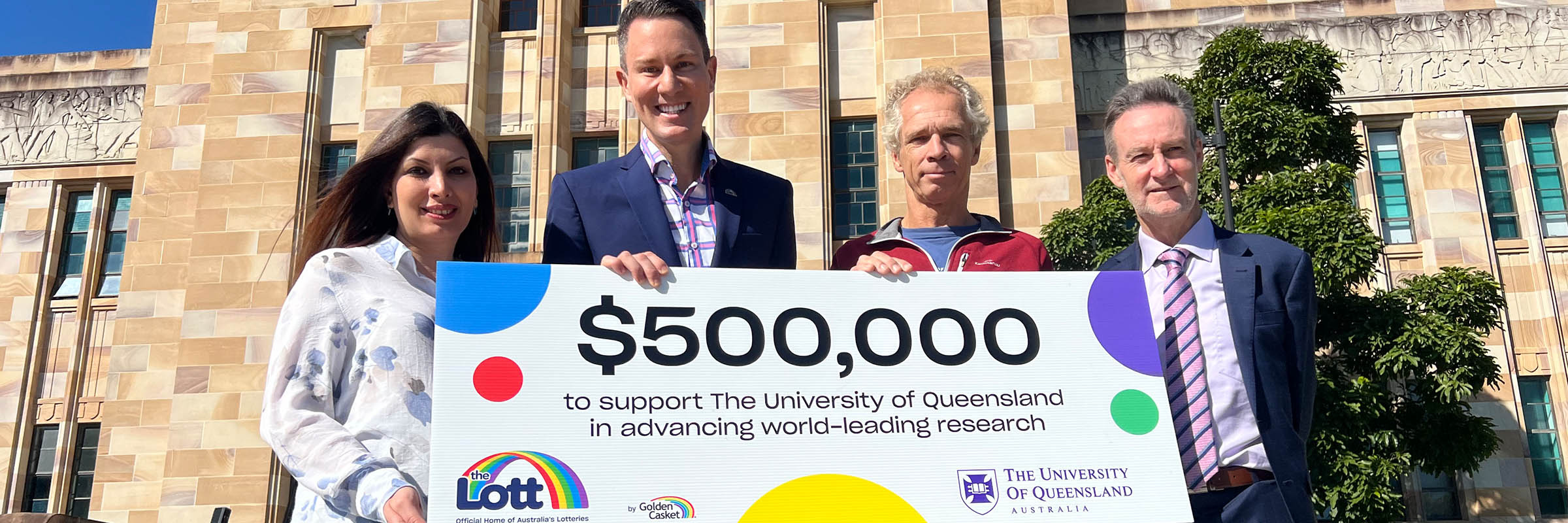$500,000 donation supports pioneering world-class Queensland research
Did you know that spider venom could be used as pain relief and do a lot of good for those suffering from chronic pain? Some could say that it’s convincing enough to remove a case of arachnophobia!
And even better, did you know that long, narrow ribbon-like plant that sits at the bottom of the ocean can assist in tackling climate change?
There's a world of possibility waiting to be uncovered thanks to The University of Queensland (UQ) and their incredible research projects.
We love what they do and that’s why we’ve given another $500,000 boost from The Lott by Golden Casket’s unclaimed prize money.
This latest contribution now sees our ongoing support of UQ roll into its fourth year which totals $3 million in donations, with this year’s donation targeting three different research areas.
Spider venom's pain relieving potential
The first of these research projects is the use of spider venom to develop new pain relief medicines.
Leading the research team at UQ’s Institute for Molecular Bioscience (IMB), is Professor Glenn King, who was awarded the Prime Ministers Prize for Innovation in 2023 for the advancement of his spider venom work.
The world-leading team have most recently announced that a molecule from the K’gari funnel web spider venom met critical benchmarks towards becoming a treatment for heart attack and stroke, potentially helping to protect the cells from damage.
Professor King and his team have been pioneering the development of peptides from spider venom into more effective therapeutics for IBS – a highly prevalent form of chronic pain that affects more than 10% of the world, and endometriosis – a chronic debilitating disease that impacts one in nine women in Australia.
Professor King said that compounds found in venom of some of the world’s largest spiders could offer relief for people suffering from intractable chronic pain.
“Chronic pain is one of the primary symptoms of women suffering from endometriosis and the 11 per cent of Australians afflicted with irritable bowel syndrome,” he said.
“There are few effective treatments for these painful conditions, so support from partners such as The Lott will allow us to develop non-addictive painkillers and work towards a world free of disease and suffering.”
Seagrass and resilient climates
The second project continues the research into understanding how seagrass meadows and healthy coral reefs can be used to help combat global warming.
Seagrass has a whole myriad of benefits, and acts as a nurturing haven for diverse marine life, protecting shorelines and reducing pollution. But with the escalating challenges of climate change these ecosystems are deteriorating on the Great Barrier Reef.
Associate Professor Chris Roelfsema, leader of this project, said that with increased understanding, his team will be able to produce viable strategies to protect seagrass and coral reefs to encourage their resilience into the future.
Associate Professor Roelfsema said coral reefs and seagrass habitats were of great significance to Australian communities and have been under pressure from various impacts.
“To help the community to understand the importance of these habitats, and the impacts corals and seagrass are exposed to, we need to provide relevant and timely information how much there is, where it is and how it’s changing,” he said.
“Developing ongoing monitoring in time and space combining photos captured underwater with satellite imagery, can provide us that snap shot of the coral and seagrass habitats.”
“Joining efforts in field data collection and satellite image analysis over a short time frame, will help the community to learn more about these beautiful marine environments, as a result of the continuing support by The Lott by Golden Casket.”
Optimising virus-neutralising vaccines
The third project that hit incredible heights last year saw UQ’s re-engineered Molecular Clamp vaccine technology platform producing a vaccine that was equally safe and virus-neutralising as an approved vaccine considered among the best in its class.
With continued investment from The Lott by Golden Casket, this pivotal proof-of-concept testing cleared the way to progress the promising Clamp2 technology in a range of research programs.
The aim is to continue to optimise the UQ Rapid Response Vaccine Pipeline that can respond to a future viral outbreak or epidemic with a safe, effective, cost-efficient and easy-to-distribute vaccine. In 2020, clinical trial for this team’s vaccine candidate for COVID-19 was among the first in the world to commence, but UQ want to get even faster to try to avert future global pandemic situations.
UQ’s Professor Keith Chappell said the Molecular Clamp was applicable across multiple different viral families including Highly Pathogenic Avian Influenza H5N1, which is causing increased concern for its potential to evolve and start a new influenza pandemic..
“While we don’t yet know whether this virus will make the jump to become a significan human pathogen, The Lott is helping us to complete preclinical development so this could be available if needed.”
The Lott Partnerships Manager Liz McPherson said that it’s a privilege to continue the support of such incredible, world-leading, Queensland research projects.
“Supporting the community is why lotteries was first established in Australia, so we’re proud to continue this tradition by donating to UQ for the fourth year in a row,” she said.
“We hope that with this donation, we help UQ to tackle some of the biggest health and environment issues of our generation.”
To learn more about these important initiatives or to find out how you can support one of UQ’s research projects, head here.
